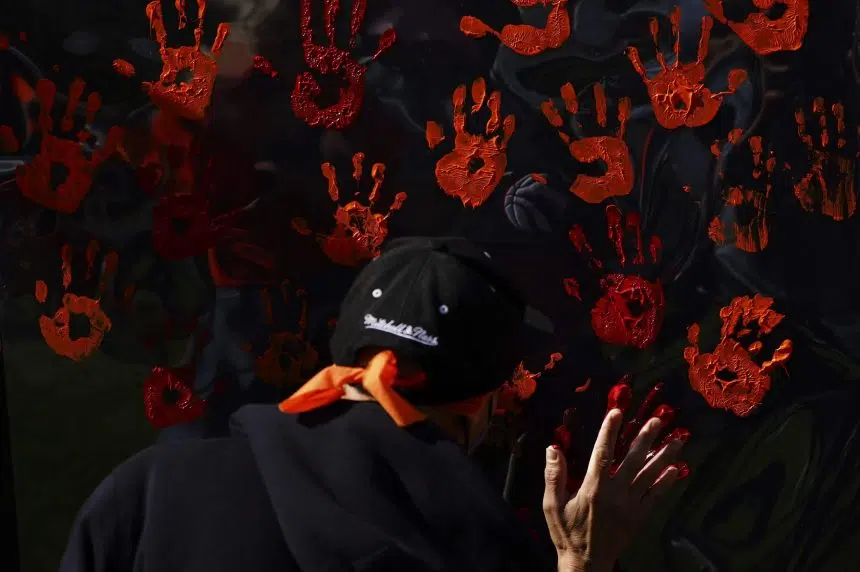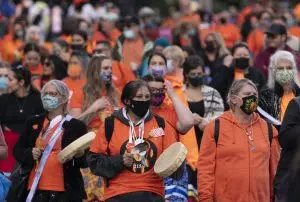The National Day for Truth and Reconciliation is a day for listening and learning.
The federal statutory holiday was created in response to one of the Truth and Reconciliation Commission’s Calls to Action, “to honour survivors, their families, and communities, and ensure that public commemoration of the history and legacy of residential schools remains a vital component of the reconciliation process.”
Marchers make their way through the streets of Ottawa following National Day of Truth and Reconciliation ceremonies on Parliament Hill, Thursday, September 30, 2021 in Ottawa. THE CANADIAN PRESS/Adrian Wyld
Rallies have been held from coast to coast across Canada, and members of the Indigenous community in Saskatchewan have been sharing with 650 CKOM and 980 CJME their thoughts on the day.
Here’s some of what they’ve had to say.
Creeson Agecoutay
Creeson Agecoutay is a journalist in Ottawa who is originally from the Cowessess First Nation.
Cowessess is where 751 unmarked graves were found at the end of June.
The announcement cut deep for Agecoutay, who has relatives who attended the former Marieval Indian Residential School.
“To this day, my family still lives with those impacts,” Agecoutay said on Thursday’s Greg Morgan Morning Show. “We don’t know our language. Our traditional language is Cree and I grew up not knowing it.
“The traumas from their experiences are still relevant to this day with our family and everybody’s families.”
Agecoutay believes that simply listening and hearing the stories of people who spent time in schools like Marieval will go a long way in making Canada a better place.
“Every little bit helps in terms of making our Canada a better place and reconciling and thinking about the future generations and what we’re going to leave behind for our children,” he said.
“Now we have a focus with reconciliation in our education system. More is always better in terms of this history and it’s a very tough history.
“I believe it needs to be learned about in a very sensitive way and when we’re older, the full truth, because it needs to get out to all Canadians about what happened in Canada.”
Cadmus Delorme
Cadmus Delorme is the chief of the Cowessess First Nation.
The work continues to try and identify the remains found in the unmarked graves, with around 300 given a name.
As Delorme reflects on the first National Day for Truth and Reconciliation, he says what is needed is better understanding of what residential school did to families and the generational impact that continues to be felt.
Speaking Thursday with Gormley, Delorme explained what happened for his family.
“This is what we inherited,” he said. “My three-generation grandmothers on my maternal side, first my great-great-great-grandmother, her name was Mary. She did not attend residential school; she was born in 1850. My great-great grandmother Gracie, she never attended residential school; she was born in 1870. My great-grandmother Maggie, she attended the Round Lake Industrial residential school.
“Maggie should have got Gracie and Mary’s vertical lineage teachings; you get your mother and grandmother’s teachings. So my great-grandmother went into horizontal survival lineage in 1907. The sexual, physical, mental abuse was real and so she never got Mary or Gracie’s teachings.
“Maggie had my grandmother Evelyn, second-generation residential school. Evelyn went into horizontal survival with her sisters and cousin. Then my mother came, Charlotte, third-generation horizontal survival mode in residential school. Here I am today, first generation not to go.
“Unfortunately, due to residential school, I never really got Gracie or Maggie or Evelyn’s teachings and my mom did what she could trying to figure out what it was to be a great parent. That is intergeneration trauma today.”
Even today, that intergenerational trauma continues and he says Indigenous families are fighting to return to a vertical lineage.
“We still have going on today horizontal lineage,” Delorme said. “Those that are now vertical did it with strength and perseverance.
“There are some who are still horizontal or are at a 45-degree angle and that is why we should not judge. We need patience and investment in what we inherited. Every Indigenous family should get the chance to become vertical again. That’s what residential school did to our kinship.”
Christine Marie
Metis entrepreneur Christine Marie talked about her hopes for the day with 650 CKOM’s Brent Loucks on Thursday.
Marie owns Awasis Boutique, an online Indigenous clothing boutique. Through the sale of orange T-shirts, she has helped raise thousands of dollars for residential school survivors.
Marie offered some advice to others who want to pay homage on the day.
“For some, it can be very intimidating so it doesn’t have to be huge. It’s literally taking this little step: ‘What can I do to act on the calls for reconciliation? What can I do in the community to show I’m standing with you?’ ” Marie said.
“It’s all these little things, but collectively it makes such a big impact.”
Neal Hughes
Former Saskatchewan Roughriders fullback Neal Hughes is Metis and he admits he used to keep that fact from people when he was younger.
Since getting more comfortable with his heritage and learning about history, Hughes is increasingly proud of his background — and proud to see a day like Thursday happen.
“It’s important to bring some education and to help people understand what the day’s about,” Hughes said on The Green Zone. “Obviously, we have some dark parts of our history.
“Being Metis and growing up in a Metis family, obviously I’ve been around Indigenous people my entire life. I’ve seen racism firsthand. I’ve experienced it first and secondhand with people not even knowing that I’m Metis.
“You hear stories. I’ve heard stories of family members being in residential schools and some family members who got lucky and didn’t have to go. I’ve learned a lot about what went on in those places a long time ago and I’m hoping that people can learn about what happened, find the truth in the whole situation, look at it and learn and be a little more understanding when it comes to these types of things.”
Hughes also is eager to see the National Day for Truth and Reconciliation resonate with all Canadians.
“I hope it doesn’t become just the daily news story or a political talking point because it’s more than that,” he said. “It’s people’s lives — people that went through this …
“There’s a cycle that’s going on because of this. It didn’t happen too long ago, so there’s a lot of people that are still suffering and trying to heal from being in residential schools.”
As part of 650 CKOM’s special programming on the National Day for Truth and Reconciliation, we’ll have a special one-hour show Thursday evening.
Listen live here to “A Day for Truth and Reconciliation” starting at 6 p.m.








